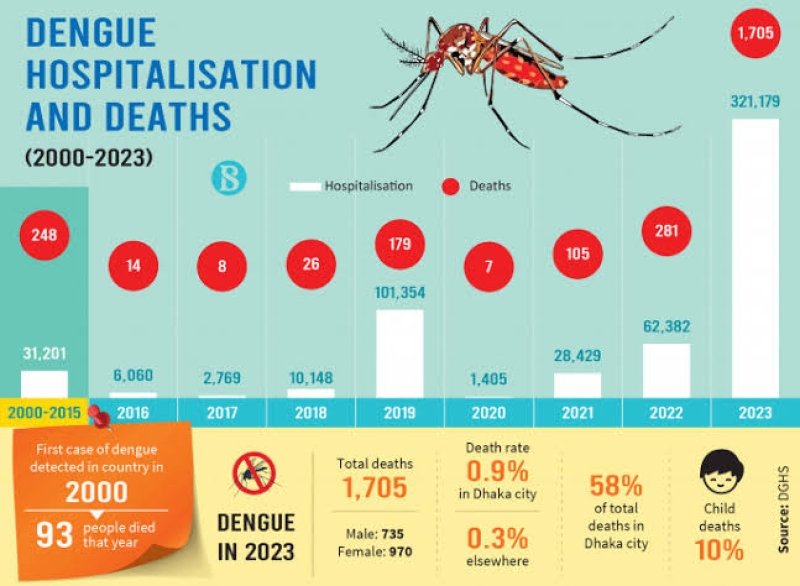- BNP fast-tracks cabinet plans after resounding victory |
- Modi Calls Tarique, Pledges India’s Support |
- Bangladesh Set for First Male PM in 35 Years |
- Presence of women voters is noticeable at polling stations in Kalapara |
- Tarique Rahman wins both Dhaka-17, Bogura-6 seats |
Bangladesh Faces Highest Dengue Death Rate in 22 Years

Bangladesh is grappling with its highest dengue death rate since 2003, with 34,121 hospitalizations and 177 deaths reported as of yesterday. The current death rate stands at 0.52%, slightly higher than last year's 0.49%. Since January 1, 2023, the nation has seen 211,683 hospitalizations and 1,030 dengue-related fatalities, marking a concerning trend in public health.
Although the total number of cases in 2024 is lower than in previous years, the current death toll is the second highest on record, according to data from the Directorate General of Health Services (DGHS) Health Emergency Operation Center.
Public health experts express alarm over the rising mortality rate, attributing it largely to repeat infections. Many individuals have been infected multiple times, heightening the risk of severe complications and death. Dr. Kabirul Bashar, an entomologist, outlined three key factors contributing to the increased mortality:
1. Reinfections: Many patients, unaware of prior infections, are now facing severe complications upon reinfection.
2. Delayed Hospitalization: Some individuals are attempting to manage their symptoms at home, seeking medical help only when conditions worsen, which can prove fatal.
3. Systemic Failures: Health services and local dengue prevention efforts have deteriorated, resulting in patients being shuffled between hospitals without adequate care.
The DGHS reports that dengue fatalities have occurred every month this year, peaking in September with 80 deaths. In just the first three days of October, there have already been 16 fatalities. The recent 24-hour period saw 1,022 new hospitalizations, with the majority of cases concentrated in Dhaka. Notably, 51.4% of the deaths have been among females, while the age group most affected includes those aged 16 to 35, accounting for 40% of fatalities.
The World Health Organization recently reported that dengue cases have roughly doubled each year since 2021, with over 12.3 million cases and more than 7,900 deaths documented in the first eight months of 2024 alone.
Dr. MH Chowdhury Lenin, a public health expert, criticized local government efforts to combat Aedes mosquitoes, stating that anticipated outbreaks were not adequately addressed. He called for a comprehensive government strategy to control mosquito populations, emphasizing the need for timely research into the current dengue strain.
Lenin suggested, “An intensive clean-up of residential areas and public spaces could significantly reduce mosquito breeding.” Last year alone, dengue claimed 1,705 lives, making it the deadliest year on record with 321,179 reported cases.
Without immediate and robust preventive measures, experts fear that the number of fatalities may continue to climb. With cases in September rising from 6,500 to over 21,000, an increase in infections is expected to persist into October and possibly November.
Dr. Kabirul warned that limited research and intervention have allowed dengue to spread nationwide, with significant increases seen in Cox's Bazar, Barguna, Chandpur, Mymensingh, and Narsingdi compared to previous years.
The DGHS data indicates that this year's outbreak has reached all 64 districts, a first for this period. The highest case numbers have been reported in the Dhaka South City Corporation (7,651 cases) and Dhaka North City Corporation (6,798 cases), followed by Chattogram, Barishal, and Khulna divisions.
In terms of fatalities, the Dhaka South City Corporation has recorded the most deaths at 95, followed by 25 in the Dhaka North City Corporation, and 21 in Chattogram. As the situation evolves, public health officials urge immediate action to curb the spread of dengue and protect vulnerable populations.

